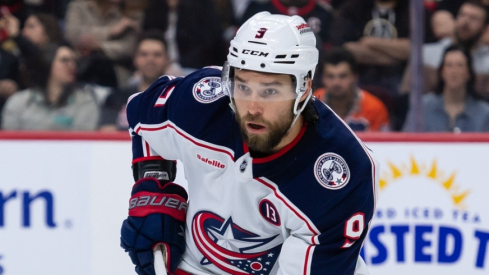Elliotte Freidman’s latest 31 Thoughts post was loaded with Blue Jackets intel regarding their star player Artemi Panarin.
GM Jarmo Kekalainen will be one of the most watched figures leading up to the NHL's Feb. 25 trade deadline, and his job got a little tougher when Panarin's agent, Dan Milstein, announced via Twitter that there would be no in-season negotiations regarding a contract extension.
As Friedman noted, Panarin is seeking a "John Tavares" situation where he selects teams to give him their best sales pitch and then make a decision on his next NHL home.
3. Artemi Panarin freezing all contract talks until after the season is another earthquake reminding teams that players are more willing than ever to maximize their leverage. Eight months after Tavares took one further step than 2016 Steven Stamkos, Panarin’s preparing everyone for a similar meet-and-greet. Tampering rules prevent open statements of lust, but jockeying is underway for an audience.
This will force teams to make even earlier assessments about their star players. Trade them at the draft a year before they hit the market? One exec said his team, if unsure about ability to contend, could weigh doing it even earlier — two trade deadlines before unrestricted free agency. There were rumours New Jersey would consider that path with Taylor Hall, currently available in July 2020. But Devils GM Ray Shero said Saturday there was “zero chance” he would trade Hall this month. (Nor, from what I understand, is Hall looking to go anywhere.)
Not long ago, the idea of trading such a player 19 months before his contract was up wouldn’t just fly in the face of normalcy. It would be like picking up conventional wisdom, slamming it to the ground and kicking dirt on its face. But, at the very least, that thinking is going to become part of every club’s process.
We are seeing the landscape in the NHL change right before our eyes.
The power is shifting to the players, big time. Steven Stamkos took it as far as talking to other teams (but did stay in Tampa), and Tavares talked and went to a new team. William Nylander held out for four months to get the deal he wanted. Auston Matthews just signed a new deal that pays him top dollar and only buys out one unrestricted free agent year, giving him the opportunity to sign another massive deal.
Now, we have the situation with Panarin and Bobrovsky. Bobrovsky has a full no-move clause so he has complete control over his situation. Panarin doesn’t, but by not willing to negotiate a contract, he is ensuring he has maximum leverage heading into free agency. He is not going to be leaving any money on the table.
Teams now must evaluate their competitive window and decide if keeping their star is worth it. This is exactly what Chicago did with Panarin two years ago; they were fresh off losing in the first round, knew their championship window was closing and thought getting the band back together with Brandon Saad would help open that window back up, plus provide some long-term clarity. It obviously didn't work out as they'd hoped, but you can see the process behind that move.
Imagine if Chicago had pushed for one of the Blue Jackets top prospects, maybe a Pierre-Luc Dubois, who at the time was having a so-so season in the QMJHL. Or, if they went for some young but unproven NHL players like a Josh Anderson, Oliver Bjorkstrand or perhaps a defenseman like Ryan Murray or Markus Nutivaara. They would have been much better off, and their future would be that much brighter.
With each passing day, it seems more and more likely the Blue Jackets are leaning toward moving Panarin. The time to commit to winning was in the summer when you had big names like Erik Karlsson and Max Pacioretty available in trade. The Blue Jackets poked around these players, but talks never appeared to get serious. They took a chance on their current roster being good enough, and for a while it looked like it might be. Now, given the team’s recent play, it might be the time to trade Panarin.

